

Cal Newport - Author of Deep Work, Study Hacks Blog. What Great Listeners Actually Do. What makes a good listener?
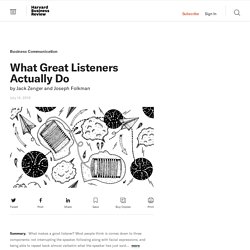
Most people think is comes down to three components: not interrupting the speaker, following along with facial expressions, and being able to repeat back almost verbatim what the speaker has just said.... Chances are you think you’re a good listener. People’s appraisal of their listening ability is much like their assessment of their driving skills, in that the great bulk of adults think they’re above average. You’re a Bad Listener: Here’s How to Remember What People Say. Listening is hard.
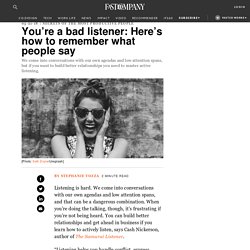
We come into conversations with our own agendas and low attention spans, and that can be a dangerous combination. When you’re doing the talking, though, it’s frustrating if you’re not being heard. You can build better relationships and get ahead in business if you learn how to actively listen, says Cash Nickerson, author of The Samurai Listener. Collaboration Overload Is Sinking Productivity. Be a Schedule Builder, Not a To-Do List Maker - Nir and Far. Keeping a calendar is not only useful for work-related tasks.
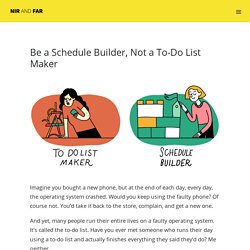
We can hold time for our important relationships and for investing in ourselves. The practice fixes all three faults of running your day with a to-do list. 5 Ways to Persuade Yourself to Be More Productive. There’s no emotion we ought to think harder about than anger. There’s no emotion we ought to think harder and more clearly about than anger.

Anger greets most of us every day – in our personal relationships, in the workplace, on the highway, on airline trips – and, often, in our political lives as well. Anger is both poisonous and popular. Even when people acknowledge its destructive tendencies, they still so often cling to it, seeing it as a strong emotion, connected to self-respect and manliness (or, for women, to the vindication of equality). If you react to insults and wrongs without anger you’ll be seen as spineless and downtrodden. Annie Bosler and Don Greene: How to practice effectively...for just about any...
Reflection.app by Holstee — A better way to journal. Bullet Journal. Pocket. “Real self-esteem is an integration of an inner value with things in the world around you,” Anna Deavere Smith wrote in her invaluable advice to young artists.
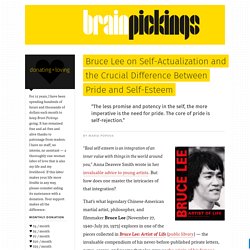
But how does one master the intricacies of that integration? That’s what legendary Chinese-American martial artist, philosopher, and filmmaker Bruce Lee (November 27, 1940–July 20, 1973) explores in one of the pieces collected in Bruce Lee: Artist of Life (public library) — the invaluable compendium of his never-before-published private letters, notes, essays, and poems that also gave us the origin of his famous metaphor for resilience.
In an essay titled “The Passionate State of Mind,” Lee writes: Our lack of self-awareness, Lee argues, makes us look to others to tell us who we are. (Learning not to do that is one of life’s hardest, most important lessons.) Pocket. Recently, a colleague and I were lamenting the process of growing older and the inevitable increasing difficulty of remembering things we want to remember.

That becomes particularly annoying when you attend a conference or a learning seminar and find yourself forgetting the entire session just days later. But then my colleague told me about the Ebbinghaus Forgetting Curve, a 100-year-old formula developed by German psychologist Hermann Ebbinghaus, who pioneered the experimental study of memory. The psychologist's work has resurfaced recently and has been making its way around college campuses as a tool to help students remember lecture material. For example, the University of Waterloo explains the curve and how to use it on the Campus Wellness website. I teach at Indiana University and a student mentioned it to me in class as a study aid he uses.
8 Productivity Techniques to Tackle Your To-Do List Everyday. No matter what’s on your list of things to do for the day, it’s easy to feel overwhelmed.

Whether it’s the book of work you told your manager you’d have done by Friday or the weekend list of grocery shopping and cleaning the house, it can feel never-ending. How you decide to cross off the items on your list is up to you, but it’s always a good idea to utilize a technique to ensure you don’t fall victim to distractions, procrastination, or just straight-up forgetting. What is a productivity technique? A productivity technique is a method or process you put in place to make sure everything, or at least almost everything, that is on your to-do list actually gets crossed off. Tips from neuroscience to keep you focused on hard tasks. Some of scientists’ most rewarding moments come when we confront a hard problem or a difficult task.
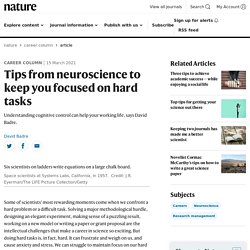
Solving a major methodological hurdle, designing an elegant experiment, making sense of a puzzling result, working on a new model or writing a paper or grant proposal are the intellectual challenges that make a career in science so exciting. But doing hard tasks is, in fact, hard. It can frustrate and weigh on us, and cause anxiety and stress. We can struggle to maintain focus on our hard tasks, including the ones we enjoy and eagerly wish to complete. We often postpone work on hard tasks, such as beginning to write a paper or do complex data analysis, in favour of quick wins from easier tasks, like fine-tuning a figure, organizing our calendars or making a dent in our e-mail correspondence. Tips from neuroscience to keep you focused on hard tasks. The Six Morning Routines that Will Make You Happier, Healthier and More Productive.
To Live Remarkably, Repeat This One Affirmation Every Single Day for the Rest of Your Life. How to Achieve Your Goals By Creating an Enemy. Eliciting reactance has been used successfully in public health efforts, such as the antismoking Truth campaign, which tried to appeal to rebellious high schoolers (who feel reactance toward just about everyone).
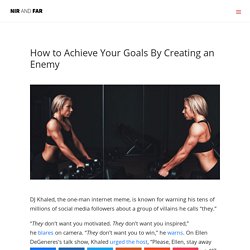
Instead of showcasing far-off consequences like emphysema and black lungs, the Truth campaign did away with the gore and instead painted the tobacco industry as a bunch of scheming jerks. In one ad activists attempt to deliver a case marked “lie detector” to the headquarters of a tobacco company and are promptly kicked out. In another spot, cartoon characters interrupt smokers at a party by shouting “It’s a trap!” We can apply the same methods to use careful scapegoating to increase our own motivation.
If we imagine a force working against us, we’re more likely to get fired up, resist our temptations, and work harder to achieve our goals. Want More Time? Do a Time Audit. The four keys that could unlock procrastination - BBC Worklife. Type 8: Common Struggles You Typically Face as an Enneagram Eight. The Common Struggles of An Enneagram 8 If you think you are an Enneagram 8 you probably don’t need this article.

You already know who you are and certainly don’t need my help to find out. I say this jokingly because Type 8’s tend to be against others and love to challenge their views and opinions. A Brief Overview of The Enneagram. Chances are by now someone has asked you “Have you heard of the Enneagram?” And your response was likely “Enna-what!?” There has been a lot of buzz about this new-ish personality assessment lately. People like Michael Hyatt, Brene Brown, and even Oprah are talking about it.
This Emotional Intelligence Test Was So Accurate It Was Creepy.